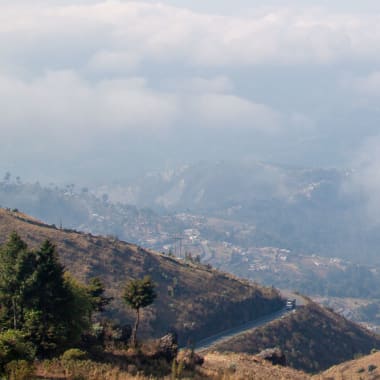-
Producer
-
Jorge Velasquez
-
Country
- Guatemala
-
Region
-
Ixconlaj, Huehuetenango
-
Altitude
-
1950m above sea level
-
Variety
-
Process
-
Harvested
-
March 2019
-
Importer
-
Cafe Imports
-
Body
-
Medium
-
Acidity
-
Bright
-
Tasting notes
-
Rosehip, toffee, red apple
-
Roast style
Guatemala
Jorge Velasquez
Finca El PlanJorge Velazquez Mendez owns Finca El Plan, a three hectare farm in Guatemala, where he grows Caturra coffee. It’s grown with some shade cover from other trees, and picked when ripe and de-puled the same day. It’s then fermented with water for 36-48 hours.
His team then washes the coffee about three times to remove all the mucilage, and dries it on shadecloth for three days.
Coffee production in Guatemala first grew in the 1860s, after the decline of the indigo trade. It was in the top five coffee-producing nations until 2011, when it was overtaken by Honduras.
We’ve shared some coffee from the Huehuetenango region previously – including Peña Blanca, Maravilla, and Los Encuentros. It’s a non-volcanic region of Guatemala that’s characterised by its high altitude and predictable climate, and often considered to produce the highest quality coffee in the country.
Ixconlaj is a rural community in the region, where most speak Mam, one of Guatemala’s indigenous languages. Most of the community are subsistence farmers, cultivating crops like corn, plantain, legumes, and coffee such as this. Coffee’s by the far the most labour-intensive of the crops, but also the one with the most potential should it reach the international specialty market.
We think Guatemala’s an origin you’ll see more in specialty, and that’s all down to a new crop of quality-focused farmers like Jorge.
Learn everything about this coffee:
Ethical, traceable sourcing
This page has all the sourcing information (variety, process, region, story, importer, and more) that our importers share with us, and give us permission to use.
The transparency helps us talk confidently about the quality and background of our product, and it helps you know exactly what you’re buying.
Learn more:
Coffee page transparency legend
Our coffee philosophy
Our business approach
Fresh harvest coffee
We only source and roast coffee from each country’s latest harvest season (so the green coffee is never older than 1 year from the time of picking, processing and packing). This ensures the sensory qualities are always at their peak and unaffected by excessive ageing.
Roasted for espresso and filter (best enjoyed black)
Roast style: omni. Omni roasts are designed to brew and taste great both as espresso and filter. Our omni single origins generally sit on Agtron values in the ~70-60 value range. So, technically, they are somewhere in the lighter side of the medium spectrum.
Designed for espresso and filter brewing. Best enjoyed black.
Learn more:
Our Loring Kestrel S35 roaster
Our roasting style and approach
Best brewed within days 15-49 post-roast
The ‘fresh is best’ saying doesn’t apply to coffee (contrary to popular belief). Waiting before opening and brewing your bag of whole coffee beans helps develop peak flavour and acidity.
But heads up: if you buy pre-ground coffee, brew it as soon as possible.
Learn more:
Our recommended brewing window
Try our custom brewing recipes
Our recipes and ratios are tailored to our coffee sourcing and roasting styles, bringing the best flavour and feel out of each coffee.
For pour over, immersion, and other filter brewing styles, check our brew guides.
For our espresso single origins, we recommend a coffee:yield ratio of 1:3:
- Dose: 20g ground coffee
- Yield: 60g espresso
- Total brew time: ~24-28 seconds
This is just a starting point! We encourage you to experiment, taste, and adjust to find the recipe that you enjoy the most.
Learn more:
Our espresso brew guide (single origin)
Brewing ratio calculator
Packaging and sustainability
- Bags: ABA-certified home compostable (AS 5810-2010)
- Labels: recyclable
- Valves (only on +250g bags): general waste
- Box and tape (online orders): recyclable
Learn more:
Our packaging
Variety
Caturra variety
Caturra is a natural mutation of Bourbon that was originally discovered in Brazil in 1937, considered to be the first naturally occurring mutation ever discovered.
The location
Coffee from Guatemala
Guatemala’s production of coffee first grew in the 1860s on the back of a declining indigo trade, which had previously existed as it’s main export. Up until 2011 Guatemala was in the top 5 highest producing coffees nations in the world, before being overtaken by Honduras.
The Huehuetenango region of Guatemala
A non-volcanic region of Guatemala characterised by high altitude and predictable climate. Often considered to produce the highest quality coffee in Guatemala
Farm processes
Washed process
Machines are used to remove the flesh from the coffee cherry before being fermented in water, washed again, and finally sun dried. This process tends to result in more distinct, cleaner flavours.

Subscribe to a world of coffee
Discover a new single origin coffee from Sample every 1-5 weeks with no delivery fees.
No up-front purchase, and you can pause, cancel, or change plans at any time.
Available to order online this week:

Mexico Isavel Lopez Pablo
Flavours of sugarcane, dried cranberry, white peach
Body Acidity
Washed Typica
April 2025 harvest
Roasted omni for filter and espresso
Mexico Isavel Lopez Pablo online
Colombia Rigoberto Chavarro
Flavours of brown sugar, wine gum, candied stone fruit
Body Acidity
Washed Pink Bourbon
February 2025 harvest
Roasted omni for filter and espresso
Colombia Rigoberto Chavarro online
Peru Miguel Estela
Flavours of honeydew melon, white grape, marmalade
Body Acidity
Washed Marshell
August 2025 harvest
Roasted omni for filter and espresso
Peru Miguel Estela online
Kenya Karimikui
Flavours of blood orange, blackberry, plum jam
Body Acidity
Washed Batian, SL28, SL34, Ruiru 11
November 2024 harvest
Roasted omni for filter and espresso
Kenya Karimikui online